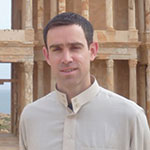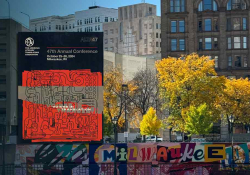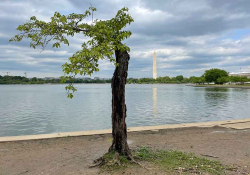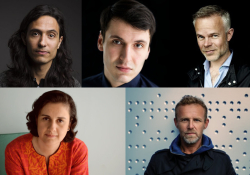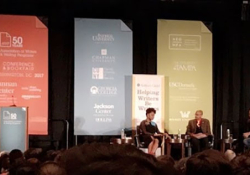Notes Toward a Poethics of Uprootedness
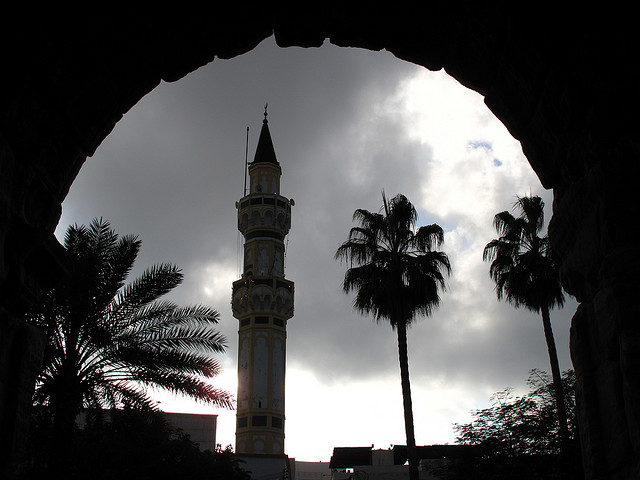
“Whoever is uprooted, uproots others.” Simone Weil’s wise words to Charles de Gaulle, future president of France, in 1943, with France still under Nazi occupation. I repeat them now while sitting across a breakfast table in Cork, Ireland, from a poet I haven’t seen in a few years, Maram al-Mazri. Maram is a Syrian poet living in Paris. She places her coffee cup down, and it wobbles on the saucer. Arriving here a week after the Paris attacks, Maram talks about French airplanes circling over her homeland. And of her brother Monzer, also a poet and part of the resistance to Assad (and daesh), who is still in Syria. She hasn’t spoken to him in a while and is concerned. Like so many exiles, Maram is divided between a life of waiting and forgetting (or trying to forget). She lives between the partialities of two places, neither really home, both ever-connected by war.
When I am invited to travel somewhere it is always with the privilege of a British passport scratching at my inside pocket. When I visited Syria to attend the now-defunct Al-Sendian Arts Festival in September 2009, I was flown over by the British Council. Upon arriving in Libya for the precariously arranged Tripoli International Poetry Festival, just after Gaddafi was killed, I stayed in the safest hotel in the city. Each night, from a window overlooking the Mediterranean, I would stare across to Italy and Greece, past oil-rig matchlights, into the swelling dark. This is a route that so many refugees have taken over subsequent years, of course, often cast adrift in leaky boats or rubber dinghies.
The nomadic condition travels backward as well as forward, perhaps also sideways, and always burrows into the earth itself. With each and every direction taken the poet might arrive, quite organically, at an ethical crossroads.
When I was in Tripoli I read poems under the Marcus Aurelius gate, and it felt like being in the center of the world. I traveled to Sabratha (now threatened by ISIS) and took in the archaeological scape of three civilizations: Greek, Roman, Libyan. I exchanged ideas with poets until dawn and stole a few notes for my own poems, some of which appear in a book I’ve just published in the US with Tupelo entitled Everything Broken Up Dances. And yet absent from that collection, and something I haven’t written about post-Tripoli, is the most memorable conversation I had over that week. It was with a Libyan poet and student called Zuhaer Alharizi, who was probably no more than nineteen back then. He told me that the floodlights of Green Square shone so brightly into his eyes that it will take a generation before he, or any Libyan, can recover from the blindness. Green Square, now renamed Martyrs’ Square, is where Gaddafi used to address the people and was also the site of early protests against his dictatorship. I wonder where the story for Zuhaer (and for Libya) ends. One of the founders of that particular festival—a great Libyan Sufi-poet, a gentle man—had his house burned down and now lives in exile in Scandinavia.
* * *
Travel is one of the supreme luxuries afforded to any writer, and much has been written about the poet as a nomad figure, from the wandering minstrel to stateless poets of the twenty-first century. There have been some illuminating poetics along the way, and the idea of poetry and nomadia as part of language makes me think of Pierre Joris’s A Nomad Poetics—a deliberately eccentric, sprawling version of which is online. Joris suggests how nomadia is inevitable for the modern poet because of our “hetero-plurality.” He situates the inevitable plurality of language alongside this, asserting that the nomadic poet (or “noet”) operates fluxively through a “between-ness” of self/selves, which are always “moving forward.”
This is positive news, and the anti-Hegelian stance is a common one. (Hegel, who divined that there is merely one other of our complete self that is in fact our lost self, missing in action all along.) However, I would argue that the nomadic condition travels backward as well as forward, perhaps also sideways, and always burrows into the earth itself. With each and every direction taken the poet might arrive, quite organically, at an ethical crossroads. Joris suggests a kind of innately privileged position, of which I am all too aware.
Questions surrounding place—such as the locational-specific vs. the loco-generic or even the will toward a poetics of location—have always fascinated me. But with fascination comes ethical responsibility, creative considerations within the act of writing, a kind of ethopoetics, particularly relevant to me when writing about others. When traveling I resist all attempts toward the tourist-as-research approach. It whiffs of the colonial impulse and is a kind of opportunistic cultural looting. And yet there are poems in Everything Broken Up Dances written explicitly for friends in Burma, Libya, and Syria that do not pretend to rely on a deepened sense of cultural immersion. I am the outsider approaching, usually, from a position of ignorant empathy.
I am the outsider approaching, usually, from a position of ignorant empathy.
Some poems in the book are offered up as acts of friendship, a kind of love poem in a new century frequently bereft of compassion. However varied my approach is, it is always, I hope, to consider, as far as possible, the individual within an individualized cultural setting. Ventriloquism is for dummies, as the saying goes. But if Joris is right, as I believe he is—in the sense that we are inevitably nomadic—I would like to track each footprint while not forgetting the essential freedom of the writer, which is that of flight. I agree with Forrest Gander who advocates, foremost, a poetics of listening. Arguably the most important sense for all writing is hearing, a refinement of which applies throughout composition, from the pre-written digestion of an idea to the slow chisel of editing, echoing thereafter.
* * *
Being half Irish, raised by an English mother, it’s always strange to be back in Ireland. The places I am from unsettle me, and uprootedness is—for me at least—a difficult luxury. We are confronted by our fragmentedness, plurality. Nomads hear an inconsistent rhythm. The sea carries us but we do not share its steadiness, the welling and sinking of its pulse. Language is a severed map. Images shudder through a life, and the poet, faced with the task of collecting or of redrawing time, wears a watch on each wrist. Both tell of a different time and tick at different speeds.

